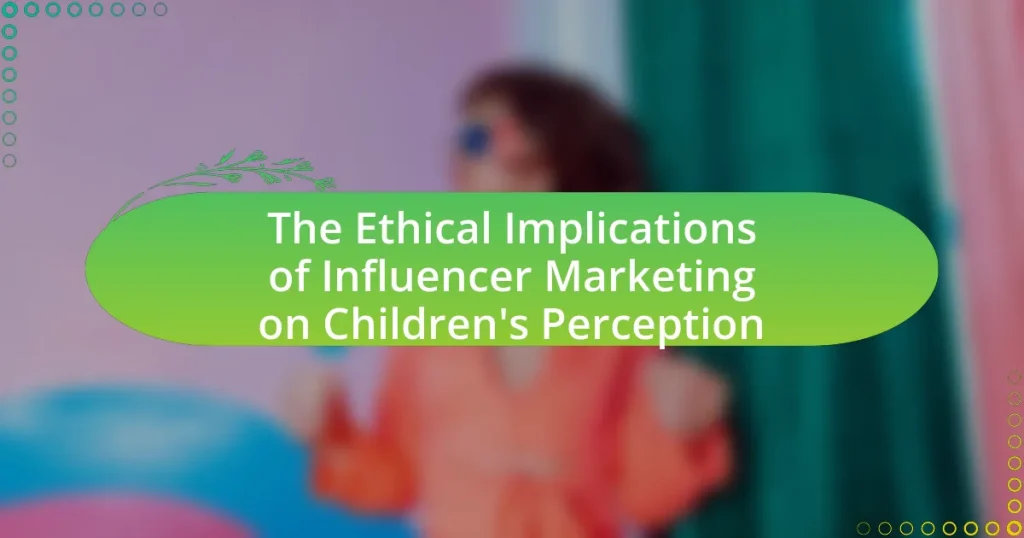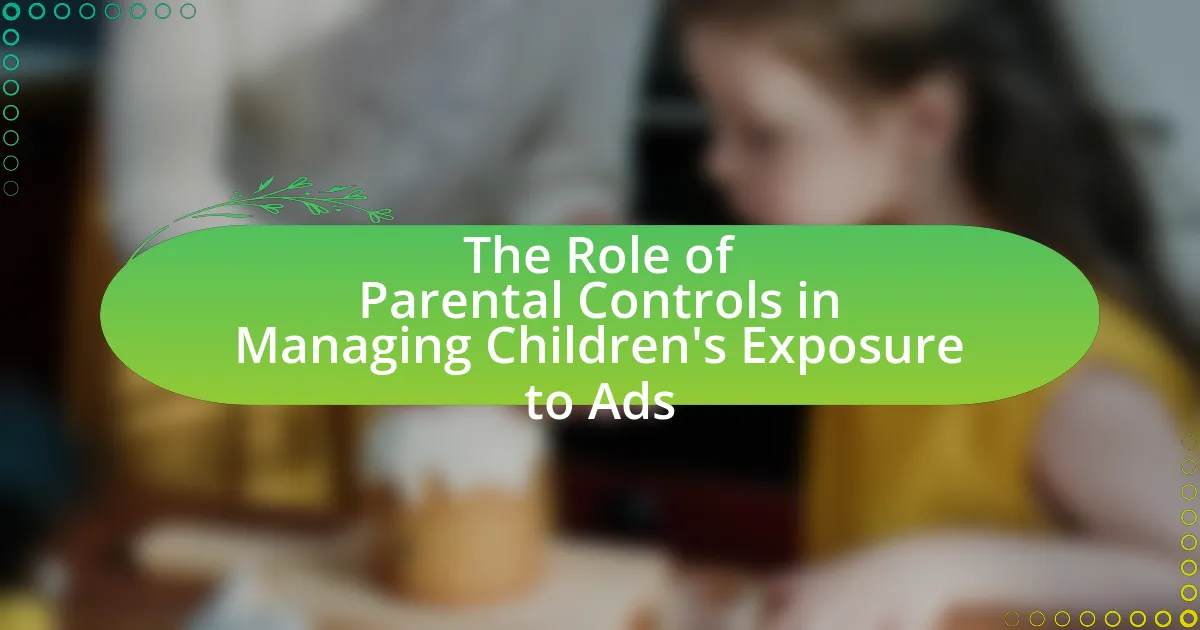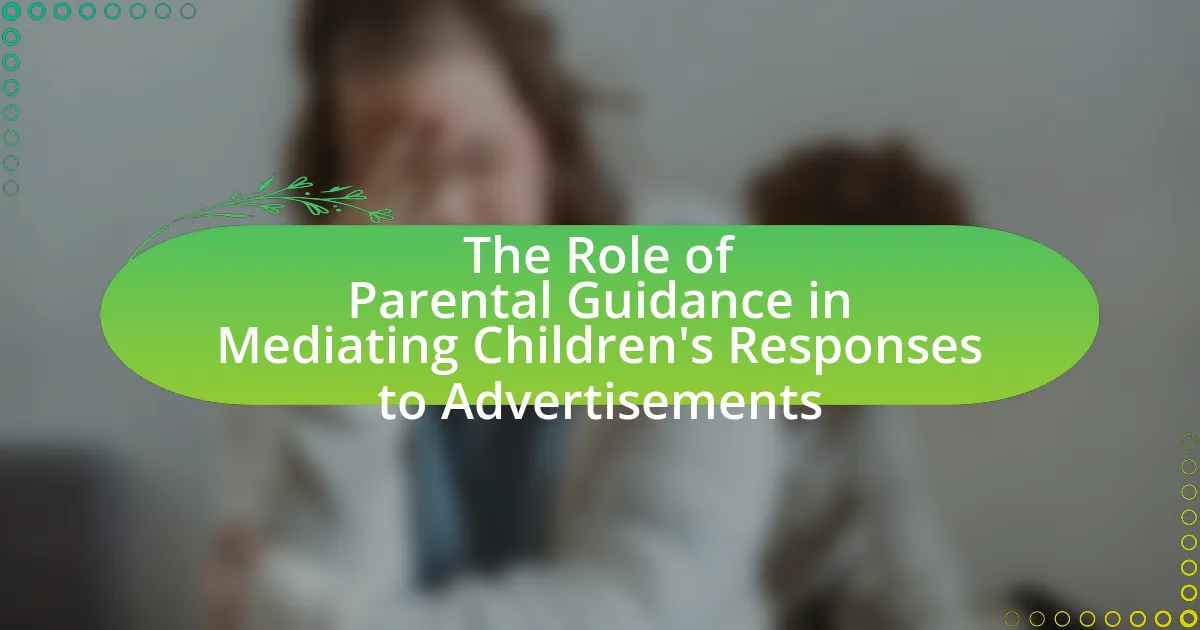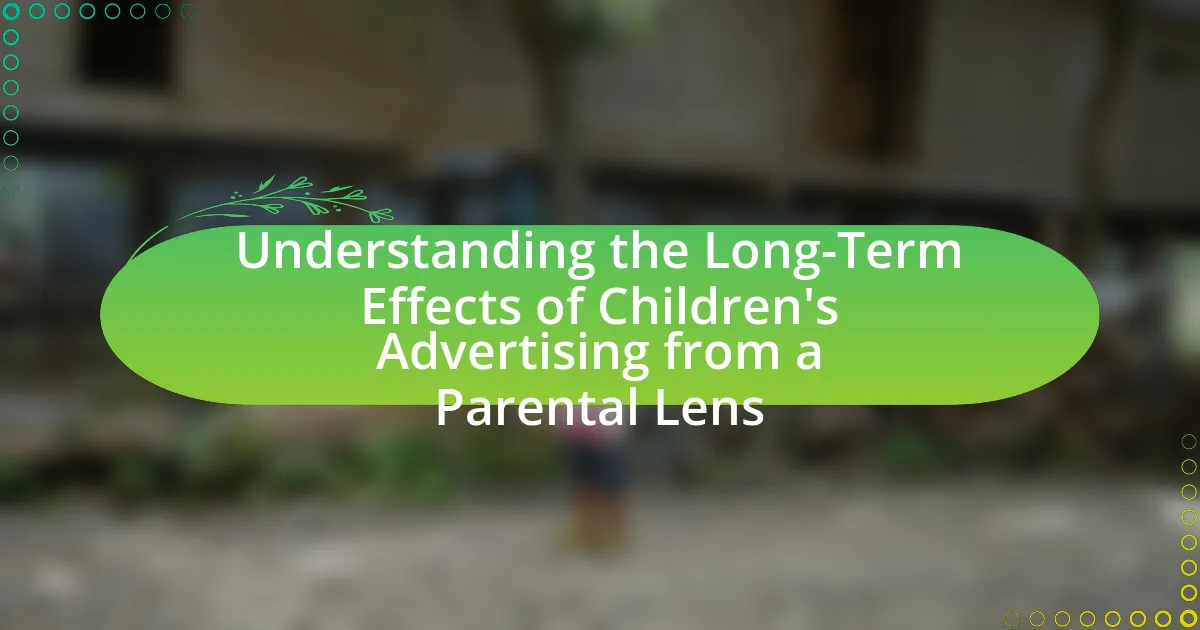The article examines the ethical implications of influencer marketing on children’s perception, highlighting concerns about manipulation, unrealistic expectations, and materialism. It discusses how influencer marketing shapes children’s understanding of reality, affects their psychological development, and influences their consumer behavior. The article also addresses the responsibilities of influencers, the role of parents in mediating marketing impacts, and the regulatory frameworks in place to protect children from unethical practices. Additionally, it outlines best practices for ethical marketing and the importance of media literacy education in improving children’s critical evaluation of influencer content.
What are the Ethical Implications of Influencer Marketing on Children’s Perception?
The ethical implications of influencer marketing on children’s perception include the potential for manipulation and the shaping of unrealistic expectations. Influencers often promote products in a way that can mislead children about the necessity and desirability of those products, fostering materialism and affecting their self-esteem. Research indicates that children are particularly susceptible to advertising messages, as they may not fully understand the persuasive intent behind influencer promotions. A study published in the journal “Pediatrics” found that children exposed to influencer marketing were more likely to express a desire for the promoted products, highlighting the influence of such marketing on their preferences and behaviors. This raises concerns about the responsibility of marketers to ensure that their content is appropriate and transparent, as well as the need for regulations to protect young audiences from exploitative practices.
How does influencer marketing impact children’s understanding of reality?
Influencer marketing significantly shapes children’s understanding of reality by presenting curated lifestyles and products as aspirational norms. This exposure can lead children to develop skewed perceptions of success, beauty, and happiness, often equating them with material possessions or social validation. Research indicates that children exposed to influencer content are more likely to adopt consumerist attitudes and may struggle to differentiate between authentic experiences and marketing tactics. A study published in the journal “Pediatrics” found that children who frequently engage with influencer content are more susceptible to developing unrealistic expectations about life, which can affect their self-esteem and social interactions.
What psychological effects does influencer marketing have on children?
Influencer marketing significantly impacts children’s psychological development by shaping their self-esteem, body image, and consumer behavior. Children exposed to influencer content often develop unrealistic expectations about appearance and lifestyle, leading to issues such as body dissatisfaction and low self-esteem. Research indicates that children who frequently engage with social media influencers are more likely to compare themselves to idealized images, which can result in negative self-perception and increased anxiety. A study published in the journal “Body Image” by Perloff (2014) found that social media use correlates with body image concerns among adolescents, highlighting the detrimental effects of influencer marketing on young audiences.
How do children differentiate between advertising and genuine content?
Children differentiate between advertising and genuine content primarily through cues such as visual and auditory signals, context, and prior knowledge. Research indicates that children as young as three can recognize advertising through distinct features like logos, slogans, and promotional language. For instance, a study by the American Psychological Association found that children develop an understanding of advertising intent around age 7, allowing them to identify persuasive content versus non-commercial information. Additionally, children often rely on the credibility of the source, such as whether the content is presented by a trusted figure or influencer, which further aids in their ability to discern between the two types of content.
Why is it important to consider children’s perception in influencer marketing?
Considering children’s perception in influencer marketing is crucial because children are highly impressionable and can easily be influenced by marketing tactics. Research indicates that children under the age of 12 often lack the cognitive ability to critically evaluate advertising messages, making them more susceptible to persuasive content. For instance, a study published in the Journal of Advertising Research found that children are more likely to trust and engage with influencers who appear relatable and authentic, which can lead to increased brand loyalty and purchasing behavior. Therefore, understanding how children perceive influencer marketing helps ensure ethical practices that protect their interests and promote responsible advertising.
What are the potential long-term effects on children’s values and beliefs?
The potential long-term effects on children’s values and beliefs include the development of materialistic attitudes and altered perceptions of self-worth. Research indicates that exposure to influencer marketing can lead children to prioritize consumerism over intrinsic values, as they often equate popularity and success with material possessions. A study published in the Journal of Consumer Research found that children who frequently engage with influencer content are more likely to adopt consumerist values, which can shape their beliefs about happiness and success throughout their lives. This shift in values can result in a diminished sense of self-esteem and an increased reliance on external validation, impacting their overall worldview and interpersonal relationships.
How does influencer marketing shape children’s consumer behavior?
Influencer marketing significantly shapes children’s consumer behavior by leveraging the trust and relatability that influencers have with their young audiences. Children are more likely to emulate the purchasing decisions of influencers they admire, which can lead to increased brand awareness and preference for products endorsed by these figures. Research indicates that children aged 8 to 12 are particularly susceptible to influencer marketing, as they often lack the critical thinking skills necessary to discern advertising from genuine content. A study published in the Journal of Advertising Research found that 70% of children reported being influenced by social media personalities when making purchasing decisions, highlighting the effectiveness of this marketing strategy in targeting younger demographics.
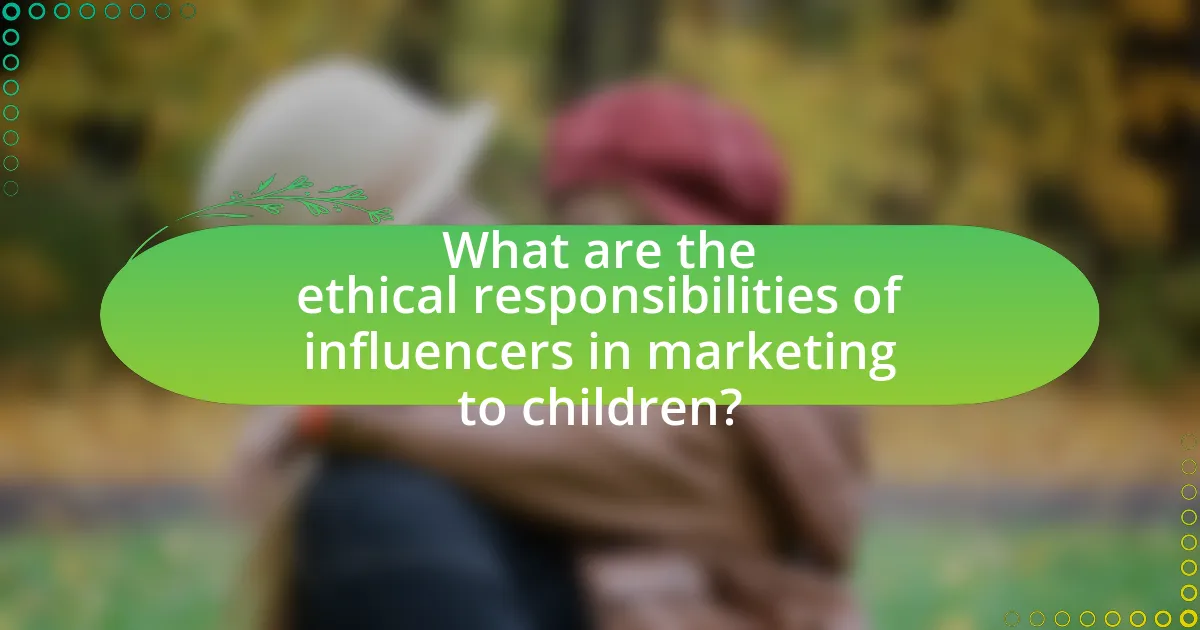
What are the ethical responsibilities of influencers in marketing to children?
Influencers have ethical responsibilities in marketing to children, primarily to ensure that their content is age-appropriate and does not exploit the vulnerability of young audiences. They must avoid promoting harmful products, such as unhealthy foods or inappropriate content, as children are impressionable and may not fully understand the implications of such marketing. Research indicates that children are less able to critically evaluate advertising, making it crucial for influencers to prioritize transparency and honesty in their promotions. For instance, the American Psychological Association highlights that children under eight years old cannot distinguish between entertainment and advertising, reinforcing the need for influencers to clearly disclose sponsored content. By adhering to these ethical standards, influencers can contribute positively to children’s development and well-being.
How can influencers ensure they are promoting products ethically to children?
Influencers can ensure they are promoting products ethically to children by adhering to guidelines that prioritize transparency, age-appropriate content, and responsible messaging. They should disclose any sponsorships clearly, as mandated by the Federal Trade Commission, which requires influencers to inform their audience when content is paid for or sponsored. Additionally, influencers must evaluate the suitability of the products for their young audience, ensuring that the items do not exploit children’s vulnerabilities or promote unhealthy behaviors. Research indicates that children are particularly susceptible to marketing tactics, making it crucial for influencers to avoid misleading claims and to promote products that align with positive values and healthy lifestyles.
What guidelines exist for ethical influencer marketing aimed at children?
Ethical influencer marketing aimed at children is governed by guidelines that prioritize transparency, age-appropriate content, and the protection of children’s welfare. The Federal Trade Commission (FTC) in the United States mandates that influencers disclose paid partnerships clearly to avoid misleading young audiences. Additionally, the Children’s Online Privacy Protection Act (COPPA) requires that marketers obtain parental consent before collecting personal information from children under 13, ensuring that children’s data is safeguarded. Research indicates that children are particularly susceptible to persuasive messaging, making it crucial for marketers to avoid exploiting this vulnerability by promoting products that may not be suitable for their age group. These guidelines collectively aim to foster a responsible marketing environment that respects children’s developmental needs and rights.
How can influencers balance authenticity with ethical considerations?
Influencers can balance authenticity with ethical considerations by prioritizing transparency and aligning their content with their genuine beliefs and values. This approach ensures that their endorsements are credible and resonate with their audience while adhering to ethical standards. For instance, the Federal Trade Commission (FTC) guidelines require influencers to disclose paid partnerships, which fosters trust and maintains authenticity. By openly communicating their motivations and the nature of their collaborations, influencers can create a responsible marketing environment that respects their audience’s intelligence and promotes ethical consumption, particularly important in influencing children’s perceptions.
What role do parents play in mediating influencer marketing’s impact on children?
Parents play a crucial role in mediating influencer marketing’s impact on children by guiding their understanding and interpretation of marketing messages. They can help children develop critical thinking skills regarding the content they consume, enabling them to discern between authentic endorsements and paid promotions. Research indicates that parental involvement can significantly reduce the susceptibility of children to marketing tactics, as children who engage in discussions about advertising with their parents are more likely to question the motives behind influencer promotions. For instance, a study published in the Journal of Consumer Research found that children exposed to parental guidance were less likely to exhibit impulsive buying behaviors influenced by social media marketing.
How can parents educate their children about influencer marketing?
Parents can educate their children about influencer marketing by discussing the nature of advertising and the motivations behind influencers’ promotions. This involves explaining that influencers often receive compensation for promoting products, which can create a biased perspective. Research indicates that children under the age of 8 may not fully understand the persuasive intent of advertising, making it crucial for parents to clarify these concepts. By engaging in conversations about the difference between genuine recommendations and paid promotions, parents can help children develop critical thinking skills regarding media consumption. Additionally, parents can encourage children to analyze the content they consume, fostering an understanding of how influencer marketing can shape perceptions and behaviors.
What strategies can parents use to help children critically evaluate content?
Parents can help children critically evaluate content by encouraging questioning and discussion about the material they encounter. This involves teaching children to ask who created the content, what the creator’s intentions might be, and whether the information is supported by evidence. For instance, parents can guide children to differentiate between advertisements and genuine content, fostering media literacy skills. Research indicates that children who engage in discussions about media content with their parents develop better critical thinking skills and are more adept at identifying persuasive techniques used in marketing (Harrison & Marske, 2005, Journal of Advertising). By modeling critical evaluation and providing tools for analysis, parents can empower children to navigate the complexities of influencer marketing and its ethical implications effectively.
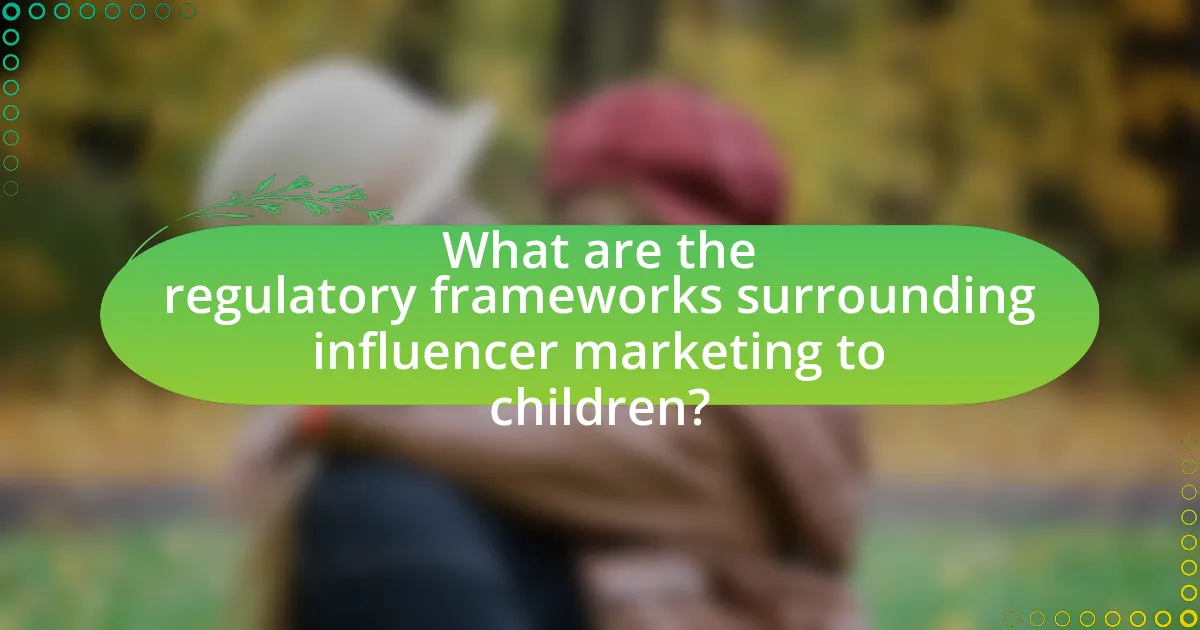
What are the regulatory frameworks surrounding influencer marketing to children?
Regulatory frameworks surrounding influencer marketing to children include various laws and guidelines aimed at protecting minors from misleading advertising practices. In the United States, the Federal Trade Commission (FTC) enforces regulations that require influencers to disclose paid partnerships clearly, especially when targeting children, as outlined in the Children’s Online Privacy Protection Act (COPPA). This act mandates that websites and online services directed at children under 13 must obtain parental consent before collecting personal information. In the European Union, the Audiovisual Media Services Directive (AVMSD) sets strict rules on advertising to children, prohibiting ads that exploit children’s inexperience or credulity. These frameworks are designed to ensure that marketing practices do not manipulate or harm young audiences, reflecting a growing recognition of the ethical implications of influencer marketing on children’s perception.
How do different countries regulate influencer marketing aimed at children?
Different countries regulate influencer marketing aimed at children through specific laws and guidelines that address advertising practices. For instance, in the United States, the Federal Trade Commission (FTC) mandates that influencers disclose paid partnerships clearly to avoid misleading young audiences. In the United Kingdom, the Advertising Standards Authority (ASA) enforces strict rules requiring that advertisements directed at children must not exploit their inexperience or credulity. Similarly, in Sweden, there is a ban on advertising directed at children under the age of 12, which includes influencer marketing. These regulations aim to protect children from potentially harmful marketing practices and ensure transparency in advertising.
What are the key differences in regulations across various regions?
Key differences in regulations across various regions regarding influencer marketing, particularly as it pertains to children, include the strictness of advertising standards, age restrictions, and disclosure requirements. For instance, the United States has guidelines from the Federal Trade Commission (FTC) that mandate clear disclosures when influencers promote products, but enforcement can vary. In contrast, the European Union has more stringent regulations under the Audiovisual Media Services Directive, which includes specific protections for minors and requires that advertising be clearly distinguishable from content. Additionally, countries like Sweden and Norway have outright bans on advertising to children under 12, reflecting a more protective stance. These variations highlight the differing approaches to safeguarding children’s perceptions and experiences in the context of influencer marketing.
How effective are current regulations in protecting children from unethical marketing?
Current regulations are moderately effective in protecting children from unethical marketing, but significant gaps remain. For instance, the Children’s Online Privacy Protection Act (COPPA) restricts the collection of personal information from children under 13, yet enforcement challenges and loopholes allow some unethical marketing practices to persist. A 2021 study by the Federal Trade Commission highlighted that many companies still engage in deceptive advertising targeted at children, indicating that existing regulations are not fully preventing unethical practices. Additionally, the rise of influencer marketing complicates enforcement, as many influencers may not disclose paid partnerships, further exposing children to manipulative marketing tactics.
What are the best practices for ethical influencer marketing to children?
The best practices for ethical influencer marketing to children include transparency, age-appropriate content, and parental involvement. Influencers should clearly disclose sponsored content to ensure children understand the nature of the promotion, as mandated by the Federal Trade Commission guidelines. Content must be suitable for the target age group, avoiding themes or products that may not be appropriate for children. Additionally, involving parents in the decision-making process helps safeguard children’s interests and promotes responsible consumption. Research indicates that children are particularly susceptible to marketing messages, making these practices essential for protecting their well-being and fostering a healthy understanding of advertising.
How can brands collaborate with influencers to promote ethical standards?
Brands can collaborate with influencers to promote ethical standards by establishing clear guidelines that align with socially responsible practices. This collaboration can involve co-creating content that emphasizes transparency, such as disclosing paid partnerships and promoting products that adhere to ethical sourcing and sustainability. Research indicates that 70% of consumers are more likely to trust brands that are transparent about their practices, which reinforces the importance of ethical marketing. By leveraging influencers who share similar values, brands can effectively reach audiences that prioritize ethical consumption, thereby enhancing their credibility and fostering a positive brand image.
What resources are available for influencers to learn about ethical marketing?
Influencers can access various resources to learn about ethical marketing, including online courses, industry guidelines, and books. Notable platforms like Coursera and Udemy offer courses specifically focused on ethical marketing practices. Additionally, organizations such as the American Marketing Association provide guidelines and best practices for ethical marketing. Books like “Ethics in Marketing” by Patrick E. Murphy and “The Ethics of Influence” by Robert Cialdini offer in-depth insights into ethical considerations in marketing. These resources collectively equip influencers with the knowledge to navigate ethical dilemmas in their marketing strategies.
What steps can be taken to improve children’s perception of influencer marketing?
To improve children’s perception of influencer marketing, it is essential to implement educational programs that teach critical thinking and media literacy. Research indicates that children who receive media literacy education are better equipped to understand the persuasive intent behind marketing messages, including those from influencers. For instance, a study by the American Academy of Pediatrics found that media literacy can significantly enhance children’s ability to critically evaluate advertisements and marketing strategies. Additionally, promoting transparency in influencer marketing, such as clearly labeling sponsored content, can help children distinguish between genuine recommendations and paid promotions, fostering a more informed perspective.
How can educational programs enhance children’s media literacy regarding influencers?
Educational programs can enhance children’s media literacy regarding influencers by teaching critical thinking skills and promoting awareness of marketing techniques. These programs can include lessons on identifying sponsored content, understanding the motivations behind influencer endorsements, and recognizing the difference between authentic and curated online personas. Research indicates that media literacy education can significantly improve children’s ability to analyze and evaluate media messages, as evidenced by a study published in the Journal of Media Literacy Education, which found that students exposed to media literacy curricula demonstrated a 30% increase in their ability to critically assess media content.
What role can schools play in teaching children about advertising and marketing ethics?
Schools play a crucial role in teaching children about advertising and marketing ethics by integrating these topics into their curricula. By providing lessons on critical thinking and media literacy, schools can help students understand the persuasive techniques used in advertising and the ethical implications of marketing practices. Research indicates that early education on these subjects can foster a more discerning consumer mindset among children, enabling them to recognize manipulative advertising strategies. For instance, studies show that children exposed to media literacy programs demonstrate improved ability to analyze advertisements and understand their intent, leading to more informed decision-making.
